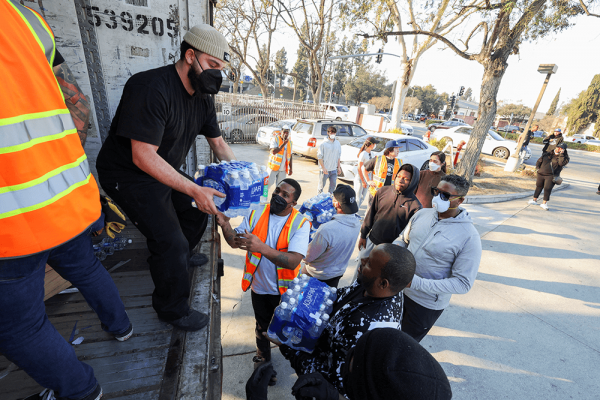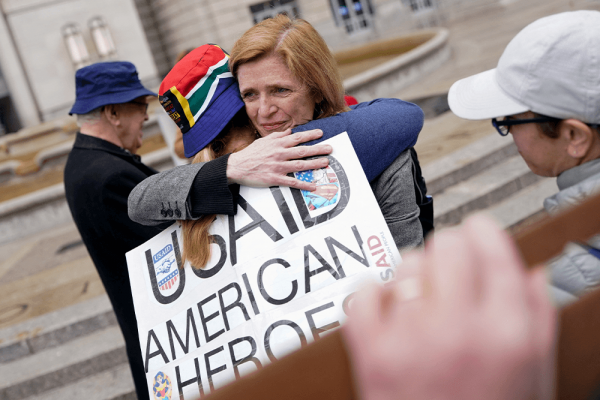Buried beneath daily headlines dominated over the past year by the Russia investigation, Brexit, and the impasse over health care lies an escalating humanitarian crisis that should be breaking our hearts and assaulting our consciences: More than 20 million people’s lives hang in the balance due to a mounting famine in Yemen, South Sudan, northern Nigeria, and Somalia.
What is even more alarming is that an estimated 1.4 million severely malnourished children will likely die in the next few months if bolder action is not taken. This mounting crisis has been declared the worst humanitarian crisis since World War II. Before you accuse me of alarmism or hyperbole, this is not my assessment but that of the United Nations and numerous, credible international NGOs who are working tirelessly to avert this crisis.
If you have heard very little about this crisis, you are not alone. A poll by the International Rescue Committee showed that 85 percent of Americans are largely uninformed about the food shortages.
Recurring drought, conflict, and instability have led to food shortages in these four countries that are so severe, they are causing large-scale starvation, malnutrition, and deaths. As Gayle Smith, former USAID administrator, aptly points out in her column on the five myths about famine, “Famine strikes countries and regions when poverty and vulnerability go untended because of government neglect, under-investment in development and, sometimes, willful obstruction. … the four crises we are witnessing now are man-made and made worse by chronic conflicts.” In 2011, during a similar multi-country food shortage crisis, the world’s failure to act in time contributed to 258,000 deaths in Somalia alone, half of them children. And half of them died before famine was officially declared. When combined with conflict, drought can have even deadlier consequences on families and children.
Despite the best efforts of many NGOs and some courageous people in the media, these stories are largely hidden from public view and drowned out by the clutter and noise of our news cycle. To make matters worse, significant barriers and risks are blocking the media from gaining access to the most hard-hit areas, which has only exacerbated the lack of real time coverage.
But there is some good news.
Multilateral agencies like the World Bank Group and the World Food Program have sounded the alarm and are working to mobilize the resources and political will needed to match the scale of the crisis. Back in March, the World Bank Group pledged $1.6 billion to build social protection systems, strengthen community resilience, and maintain service delivery to the most vulnerable, and the World Food Program is seeking to scale up its delivery of emergency food assistance across all four countries. Eight international relief NGOs, including World Vision, have formed an unprecedented alliance called the Global Emergency Response Coalition, which has attracted backing from several U.S. corporations, including Blackrock, PepsiCo, and Google to match funds raised for the humanitarian response.
Despite these valiant efforts, the U.N. Office of the Coordination of Humanitarian Affairs reports that only 43 percent of the $6.27 billion needed to avert famine this year has been raised. Unbelievably, the Trump administration and some in Congress have threatened to slash by up to 40 percent U.S. foreign assistance — life-saving funding that includes emergency humanitarian assistance.
The woefully inadequate global response makes me wonder why our churches have been relatively silent and why this crisis remains so far from reaching a tipping point of public consciousness and even righteous indignation. My sense is that without the haunting and harrowing images of starving women and children blanketing our evening news and social media feeds, this crisis will remain far too invisible. And without references to this crisis in our weekly sermons and communal prayers, the cries of those most impacted will remain unheard.
So I wonder how would Jesus respond? Not the overly meek and mild Jesus who is only interested in soul salvation that some churches promote. No, I’m talking about the biblical Jesus who demonstrated and preached both grace and steadfast love — and a radical commitment to compassion and justice. Short of Jesus performing one of his famous miracles of multiplying fishes and loaves to compensate for the drought and ensure that everyone has enough, I can picture Jesus speaking against the brutal disregard for the sacredness of every human life and saying woe to leaders who ignore the weightier matters of the justice and mercy.
In the often quoted text in Matthew 25, Jesus doesn’t mince words when he condemns those who ignore the hungry saying in verses 41-42: “Depart from me, you who are cursed, into the eternal fire prepared for the devil and his angels. For I was hungry and you gave me nothing to eat.”
There is no more horrific form of hunger than starvation or acute malnutrition.
Sadly, statistics about the scale and urgency of this crisis seemingly have the unintended consequence of making people feel either overwhelmed or desensitized. And while there is no easy or immediate fix to the conflict between warring factions in South Sudan, or to violent extremism being fueled by Boko Haram in northern Nigeria, or the political instability in Somalia, or the ongoing war in Yemen, these ongoing conflicts cannot serve as an excuse for inaction.
Statistics detached from humanizing stories create what I like to refer to as the “Goliath effect,” in which we become paralyzed and impotent in the face of seemingly intractable or hopeless issues. While there is no magic bullet to reversing the crisis in these four countries, and a permanent solution will require a cessation of fighting and peacebuilding, there are tangible smooth stones that each of us can use right now to save lives and make a difference.
So what can you do? You can write an op-ed for your local paper in order to sound the alarm and galvanize awareness with your own words, or promote this cause on social media. You can call your members of Congress and ask that they protect funding for foreign assistance, including by increasing funds for emergency humanitarian assistance. You can preach or speak about this crisis within your churches. You can donate to organizations who are working courageously on the frontlines of the famine response, including through the Global Emergency Response Coalition.
You can pray that the church and our political leaders start to respond to the famine in South Sudan, Yemen, northern Nigeria, and Somalia in similar fashion to how Jesus responded to hunger in his midst: with deep compassion and bold action.
Got something to say about what you're reading? We value your feedback!







